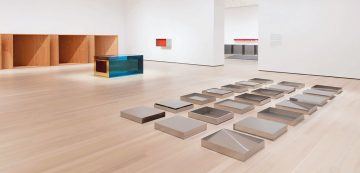Hal Foster at Artforum:
 For all his resistance to “anti-art,” Judd articulated most of his motives in the negative. Above all, he was opposed to “illusionism” and “rationalism,” which, in his view, were closely linked. “Three dimensions are real space,” he wrote in “Specific Objects.” “That gets rid of the problem of illusionism.” Why did Judd object to this “relic of European art” so strongly? Again, his argument was not avant-gardist—that abstraction had voided illusionism once and for all (it hadn’t, in any case). Rather, the problem was that illusionism was “anthropomorphic,” by which he meant not simply that it allowed for the representation of the human body, but that it assumed an a priori consciousness, whereby the subject always preceded the object. In short, like composition, illusionism was “rationalistic,” a vestige of an outmoded idealism in need of expunging. “There is little of any of this in the new three-dimensional work,” Judd insisted. “The order is not rationalistic. . . . [It] is simply order, like that of continuity, one thing after another.”
For all his resistance to “anti-art,” Judd articulated most of his motives in the negative. Above all, he was opposed to “illusionism” and “rationalism,” which, in his view, were closely linked. “Three dimensions are real space,” he wrote in “Specific Objects.” “That gets rid of the problem of illusionism.” Why did Judd object to this “relic of European art” so strongly? Again, his argument was not avant-gardist—that abstraction had voided illusionism once and for all (it hadn’t, in any case). Rather, the problem was that illusionism was “anthropomorphic,” by which he meant not simply that it allowed for the representation of the human body, but that it assumed an a priori consciousness, whereby the subject always preceded the object. In short, like composition, illusionism was “rationalistic,” a vestige of an outmoded idealism in need of expunging. “There is little of any of this in the new three-dimensional work,” Judd insisted. “The order is not rationalistic. . . . [It] is simply order, like that of continuity, one thing after another.”
more here.
